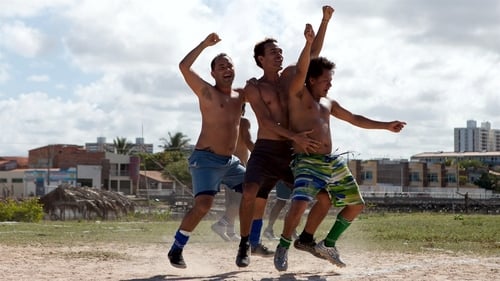
Director
Short film by Everlane Moraes, for the "Programa Convida", from IMS, dedicated to creation during quarantine.

In the dense night, when the moon lifts the tide, beings trapped in the daily life of water scarcity, they are hypnotized by the powers of Yemaya, the goddess of the sea.

Writer
In the dense night, when the moon lifts the tide, beings trapped in the daily life of water scarcity, they are hypnotized by the powers of Yemaya, the goddess of the sea.

Director
In the dense night, when the moon lifts the tide, beings trapped in the daily life of water scarcity, they are hypnotized by the powers of Yemaya, the goddess of the sea.

Writer
On the stage of a destroyed theater, we saw a play in which Elizabeth, Mercedes and Crisalida, three black women at different stages of life, relive everything they suffered from the interpretation of their own conflicts in the form of inner monologues.

Director
On the stage of a destroyed theater, we saw a play in which Elizabeth, Mercedes and Crisalida, three black women at different stages of life, relive everything they suffered from the interpretation of their own conflicts in the form of inner monologues.

Director
The daily life of an Afro Cuban family and the relationship between the carnal and the spiritual in the sacrifice of their last cock to eat.

Director
Everton's painting, the focus of this documentary, expresses what is most real in man's life. In the eyes of this artist, humanity is revealed by the most sublime and also the most obscure aspects. The artist creates the possibility of the human being redeemed through self-evaluation. His painting is not intended to please, but to prod. She is like a revelation of the beautiful through the ugly.

Decorator
Frightened by the routine of marriage, a young couple of modest origin thinks they can revive the flame of their passion through new sexual experiences. Regrettably, the confrontation with their own taboos is going to complicate their relation, plunging them into the most absurd situations unless no fantasy can come true. The inevitable intimate revelations, which are made in the course of this exposure, are going to push the couple on the edge of the abyss.

Editor
The documentary "Caixa D'água: Qui-lombo is this?" It reports, through testimonies from former residents and photographic collections, the importance in the cultural and historical scope of the Getúlio Vargas neighborhood located in Aracaju, capital of Sergipe. Emphasis is placed on black culture and the presence of black slaves and their descendants, with the rescue of issues related to their origin, orality, geographical location and awareness of their racial identity, showing that, although this community exists in an urban area, it still maintains many aspects of the quilombo life of the former black slaves in Brazil.

Screenplay
The documentary "Caixa D'água: Qui-lombo is this?" It reports, through testimonies from former residents and photographic collections, the importance in the cultural and historical scope of the Getúlio Vargas neighborhood located in Aracaju, capital of Sergipe. Emphasis is placed on black culture and the presence of black slaves and their descendants, with the rescue of issues related to their origin, orality, geographical location and awareness of their racial identity, showing that, although this community exists in an urban area, it still maintains many aspects of the quilombo life of the former black slaves in Brazil.

Director
The documentary "Caixa D'água: Qui-lombo is this?" It reports, through testimonies from former residents and photographic collections, the importance in the cultural and historical scope of the Getúlio Vargas neighborhood located in Aracaju, capital of Sergipe. Emphasis is placed on black culture and the presence of black slaves and their descendants, with the rescue of issues related to their origin, orality, geographical location and awareness of their racial identity, showing that, although this community exists in an urban area, it still maintains many aspects of the quilombo life of the former black slaves in Brazil.

Director of Photography

Editor

Producer

Director











